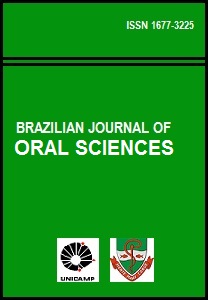Abstract
Aim: The aim of this study was to evaluate the micro shear bond strength of different ceramic systems - IPS Empress 2, Cergogold, In-Ceram Alumina and Cercon - and a dual luting agent. Methods: Twelve specimens of each ceramic were fabricated and divided according different surface treatments: Group 1: No additional treatment was applied to the ceramic surface; Group 2: Ceramics were etched with 9.5% hydrofluoric acid; Group 3: specimens treated with airborne particle abrasion for each ceramic system in accordance with manufacturer’s instructions (n=20). The tests were performed after 24 h or after water storage for 6 months. Data were then assessed statistically using the 3-way ANOVA and the Tukey’s test (P<0.05). Results: For Cergogold and IPS Empress 2 systems, the treatments performed with airborne particle abrasion and hydrofluoric acid showed no significant differences from each other, and both were superior to the groups without treatment. For Cercon and In-Ceram ceramics, no differences were found among the groups (P<0.05). When the surface was treated with hydrofluoric acid, the highest bond strength was found to IPS Empress 2 in the 6-month storage period (P<0.05). Conclusion: Lower bond strength values were only observed with IPS Empress 2 ceramic for the control group in the 6-month storage (P<0.05).The Brazilian Journal of Oral Sciences uses the Creative Commons license (CC), thus preserving the integrity of the articles in an open access environment.
Downloads
Download data is not yet available.

